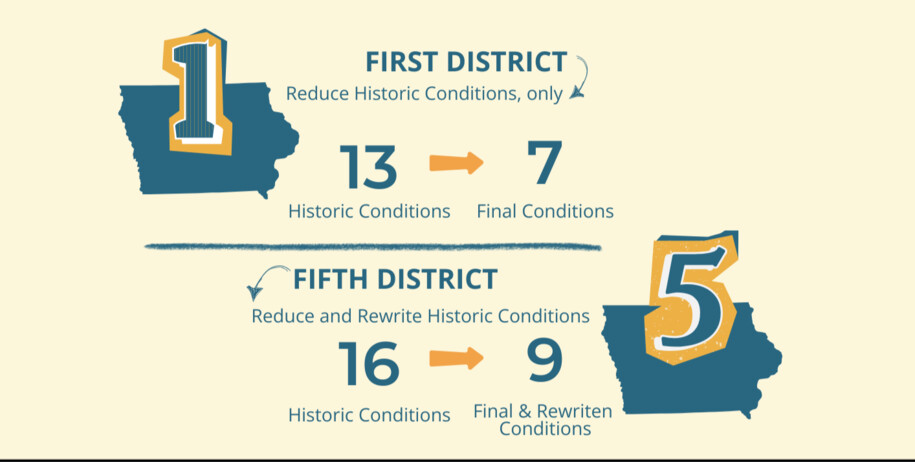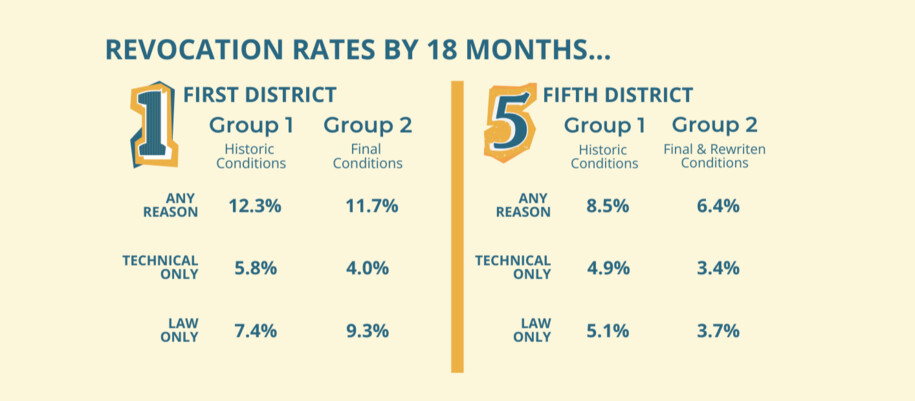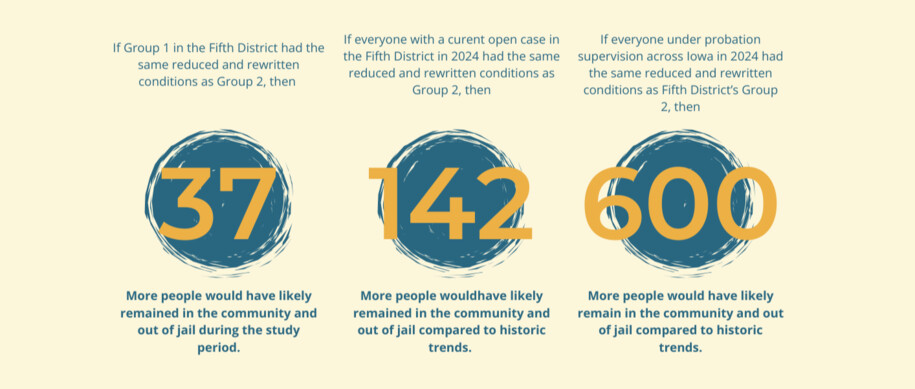For Immediate Release: Thursday, June 19, 2025
Media Contact: Zach Carlyle | zach.carlyle@iowa.gov | (515) 415-7235
Author: Jordyn Rosario, Justice System Partners
Historically, Iowa’s Department of Corrections, and many probation agencies across the country, have relied on numerous probation conditions, or the set of rules, to provide structure and guidance for individuals under supervision. Yet, recent research shows many individuals struggle to follow these rules because there are often too many rules, the rules do not offer flexibility to a population with few resources to comply with them, and the rules do not align with the research on behavioral change. Too often, then, individuals return to jail, for breaking these rules—coined, “technical violations.” Across many jurisdictions these technical violations are the primary driver to returning to jail—not new crimes.
In 2020, the Iowa Department of Corrections, recognizing how often individuals return to local jails for technical violations, began a courageous journey to critically reevaluate their use of probation conditions. In partnership with Justice System Partners (JSP), two Iowa districts—the 1st District and the 5th District—did something no other jurisdictions across the country have tried, they stopped using many historic conditions.
After 18 months of following individuals under supervision with fewer conditions across these two districts, the results are indisputable: fewer conditions combined with conditions which offer greater flexibility help more people successfully complete probation.
The Courageous Journey
Leaders in the 1st and 5th Districts met with JSP researchers in March 2020 to begin assembling advisory teams for their district. In the 1st District this included district probation and supervisory staff, facility managers, court administrators, defense bar, and individuals previously under supervision in the district. In the 5th District, this included district staff, the county attorney, defense bar, a mental health professional, the Chief Judge, and involvement of individuals previously under supervision in the district. Each district’s advisory team began reviewing violation and revocation data in summer 2020.
In the 1st District, the team was also responsible for evaluating the use of the district’s 13 historic conditions and making recommendations to remove as many as possible. The 5th District’s team was also responsible for removing as many conditions as possible and rewriting the remaining conditions. When they rewrote the conditions, they did so to align with the research on behavioral change, ultimately giving individuals greater time and flexibility to comply with the rules.

In March 2021, both advisory teams finalized their conditions. The First District’s team removed 6 of the 13 historic conditions leaving a final total of 7 conditions. The Fifth District’s team removed 7 of the 16 historic conditions leaving a final total of 9 conditions. The team also rewrote most of the remaining conditions.
Creating Groups to Compare Revocation Rates
Both districts started using their updated set of conditions for all new individuals who started supervision on December 1, 2021. JSP researchers followed individuals with the new conditions in each district evaluating their violation and revocation rates at 6-months, 12-months, and 18-months. JSP researchers compared these violations and revocation rates to a group of individuals in each district assigned to probation prior to December 1, 2021.

This effectively resulted in four groups, two in the 1st District and two in the 5th District. Individuals across all four groups mostly were under supervision for non-violent misdemeanor convictions, many were white men, and there were no large differences between the Iowa Risk Revised levels across the groups. JSP researchers considered violations and revocations across the four groups for (1) any reason; (2) technical violations only; and (3) law violations only.
Evaluating Success & Impacts on Public Safety in Both Districts
Across both the 1st and 5th Districts, most individuals are successful under probation supervision. In fact, by 18-months, on average across the four groups, 90% of individuals successfully complete probation supervision. This is the direct result of probation officers across both districts tirelessly working and investing in individuals on their caseload.
However, by 18-months, individuals who experienced the reduced conditions in the 1st District had no better nor worse revocation rates compared to individuals with the historic conditions in this district. This suggests that while reducing the number of conditions does not improve outcomes for individuals under supervision, it does not result in more revocations for any reason, either.

By 18-months in the 5th District, individuals who experienced the reduced and rewritten conditions had faired significantly better than individuals with historic conditions. This group had fewer revocations for any reason, few revocations for technical violations only, and fewer law only revocations. Simply, fewer conditions and offering greater flexibility within the remaining conditions helped more people succeed.
The Future of a Courageous Iowa Department of Corrections
Between March 2020 and October 2023, leaders and staff from the 1st and 5th Districts courageously did what perhaps other probation agencies have always said was impractical – they stopped doing what’s always been done. They critically evaluated the purpose of conditions and how staff use and enforce them in practice. In doing so, they made fewer and more flexible rules, and helped more individuals stay in the community.
Historic business-as-usual conditions require individuals to:
- secure/retain employment,
- secure/retain housing,
- immediately report changes in addresses or employment,
- stay away from others with criminal convictions,
- enroll and engage in various treatments (e.g., anger management, drug),
- attend meetings at the probation department,
- avoid specific places like bars or other settings where alcohol may be present,
- pay expensive fines and fees.

These conditions may seem simple enough and may reflect the types of activities we expect from people trying to change their circumstances. However, in practice, these conditions assume compliance is entirely individualistic and assume it is entirely possible for people to do all these things at once. When they cannot comply, and after working with their case manager, they may return to jail.
Too often across the U.S., and within Iowa, individuals cycle between jail, probation, and jail again from these technical revocations. This recasts probation not as a community sentence but delayed incarceration. However, the courageous work of the Iowa Department of Corrections shows reducing the number of historic conditions does not increase violation rates or revocation rates. More importantly, it does not make communities less safe.
This study also reveals that reducing conditions alone is not enough to keep individuals in the community. This study shows when we give individuals fewer rules and explicitly give people opportunities to change overtime with flexible, change-oriented conditions, people do significantly better.
These lessons provide a roadmap for the Iowa Department of Corrections to continue to challenge the status-quo. It also makes the Iowa Department of Corrections not only a courageous leader in the community supervision field, but a national model for other agencies.
Iowa DOC leaders will make the report: Safely Reducing the Number of Standard Probation Conditions: A Pathway toward Reducing Probation Revocations in Iowa available to staff in the coming months.
-
About the Iowa Department of Corrections
The Iowa Department of Corrections is making significant strides to implement evidence-based practices system-wide that are proven to reduce victimization, reduce recidivism and enhance community safety. The IDOC is a nationally recognized leader in corrections for innovation and implementation of evidence-based practices. Being on the forefront of innovation and practice, the IDOC continues its commitment to be the best corrections system in the country.
| Follow the Iowa DOC on Social Media | |||
|---|---|---|---|

|

|

|

|
###
